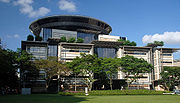| This is a sandbox for an article that is being edited as part of an educational assignment called the SMU Constitutional and Administrative Law Wikipedia project. If you are not a member of the project, please do not edit this article. To contact the project co-ordinator please leave a message at "User talk:Smuconlaw". |
| Sgconlaw/Yong Vui Kong v. Attorney-General | |
|---|---|
 This case was heard in the Supreme Court division in 2011, following the High Court decision in 2009. | |
| Court | Court of Appeal of Singapore |
| Full case name | Yong Vui Kong v Attorney-General |
| Decided | 4 April 2011 |
| Citation | [2011] 2 S.L.R. 1189; [2011] SGCA 9 |
| Case history | |
| Prior action | Yong Vui Kong v Attorney-General [2011] 1 S.L.R. 1 H.C.. |
| Related actions | Public Prosecutor v Yong Vui Kong [2009] SGHC 4 H.C.; Yong Vui Kong v Public Prosecutor and another matter [2010] 3 S.L.R. 489; [2010] SGCA 20 C.A.; Yong Vui Kong v Public Prosecutor [2012] 2 S.L.R. 872; [2012] SGCA 23, C.A.. |
| Court membership | |
| Judges sitting | Chan Sek Keong C.J., Andrew Phang Boon Leong and V K Rajah JJA. |
| Case opinions | |
| The application for recusal of a judge must be made on credible grounds; and the rule against bias applies in the clemency process vis-à-vis the Cabinet. | |
Yong Vui Kong v Attorney-General was decided by the Court of Appeal of Singapore in 2011. This appeal arose from a series of cases from the lower courts involving drug trafficking and a challenge of the mandatory death penalty. In his application, the Appellant, Yong Vui Kong, sought leave to commence judicial review proceedings on the exercise of clemency power. The Appellant unsuccessfully sought declarations that the power of clemency was exercisable at the President's discretion; that he should be granted clemency; that he was entitled to disclosure of the relevant materials sent to the Cabinet under Article 22P(2) of the Constitution of the Republic of Singapore, as well as an indefinite stay of execution of his death sentence.
Chan Sek Keong C.J. (as he then was) dealt with the application for his recusal at the outset, and dismissed the application on two grounds. Firstly, the Appellant lacked sufficient evidence to support his assertion that Chan C.J. had, during his tenure as Attorney-General ("AG"), advised the President that he had no discretion in the exercise of the clemency power. Secondly, even if he had given such advice to the President, his advice was not “wrong in law” and did not put him “in conflict with any reading of the Constitution.” In their joint judgment, Andrew Phang Boon Leong J.A. and V. K. Rajah J.A. agreed with the reasons set out by Chan C.J.
The Court acknowledged that the rule against bias could apply to the "ultimate authority" in the clemency process as it was possible for the ultimate decision-maker to be placed in a position of conflict of interest. Since the Court found that the "ultimate authority" is the Cabinet, then there was no merit in Appellant’s submission that the clemency process “had been tainted by a reasonable suspicion of bias by reason of predetermination” merely due to the statements made by the Law Minister. In its opinion, the Law Minister’s statements were neither indicative of any predetermination on his part, nor could his statements be representative of the entire Cabinet. The rule against bias also could not be applied in the same way it did to a Minister making a public statement on the government’s policy on a particular issue, as it did to a judicial or quasi-judicial officer. The Court subsequently dismissed the appeal.